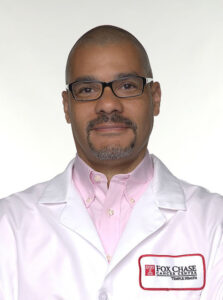Q&A with Dr. Paul Campbell: Taking Aim at Pancreatic Cancer
August 13, 2021Dr. Paul Campbell, who received a Foundation Research Starter Grant in 2016, specializes in cancer signaling, with a goal to uncover novel targets for therapeutic development.

Paul Campbell, PhD
Cancer is the second most-common disease-related cause of death in the United States (after heart disease), taking the lives of hundreds of thousands of Americans every year. Some forms of cancer are particularly deadly, including pancreatic cancer, which Foundation alumnus Paul Campbell, PhD, is working hard to eliminate.
Dr. Campbell, who received a Foundation Research Starter Grant in 2016, is an Assistant Professor at the Marvin and Concetta Greenberg Pancreatic Cancer Institute, part of the Fox Chase Cancer Center in Philadelphia, PA., where he specializes in cancer signaling.
He describes his goals as a cancer researcher are to “uncover novel targets for therapeutic development, as well as be able to provide a better decision-making platform for the drugs clinicians currently have as the standard of care.”
Dr. Campbell’s lab focuses on the K-Ras oncogene and its signaling in pancreatic ductal adenocarcinoma (PDAC). While K-Ras is commonly hyperactivated (by mutation or extrinsic upstream signaling) in many cancer subtypes, and activating mutations occur in approximately 95% of PDAC cases, it remains a largely intractable target pharmacologically-speaking. Dr. Campbell is investigating the signaling cascades driven by K-Ras function to illuminate potential therapeutic targets.
Dr. Campbell received his PhD from McGill University in Pharmacology and Therapeutics; a master’s degree in Physiology from University of Toronto; and a bachelor’s degree in Pharmacology, also from University of Toronto. He was a postdoctoral fellow at the University of North Carolina at Chapel Hill, Lineberger Comprehensive Cancer Center.
Among his awards and honors, Dr. Campbell has received the AACR Minority Scholar in Cancer Research Award; the Susan G. Komen Breast Cancer Foundation Postdoctoral Fellowship; University of North Carolina Lineberger Comprehensive Cancer Center Clinical Translational Research Award; McGill University Centre for Translational Research in Cancer Fellowship; and the McGill University Faculty of Medicine Fellowship – Alex Dworkin Scholarship in Oncology.
In an email interview recently with the PhRMA Foundation, Dr. Campbell offered insights into his work, the impact of the Foundation’s funding, and advice for those considering careers in research:
What is the potential impact of your work on patients with pancreatic cancer? What are some of the specific challenges your research is aimed at solving or overcoming?
We often think of cancer existing in (and creating) a particular neighborhood mixture of tumor cells, support cells, blood vessels, and mesh, and we call this neighborhood the tumor microenvironment. In pancreatic cancer, the tumor microenvironment is different in many ways compared to other tumor types, and this unique neighborhood makes it difficult to use standard chemo- and radiotherapies to kill the tumor, and also it inhibits the body’s own immune system to kill the tumor. The tumor cells secrete chemicals (including chemokines) to alter the behavior of their neighboring cells and make the microenvironment better for cancer growth and metastasis. Our lab group studies how the different neighbors speak to each other using these chemical languages, with the goal of disrupting or changing the conversation to make the tumor microenvironment less cancer-permissive and to create more tumor cell killing opportunities. Our work is designed to discover new targets for drug therapy, and to find ways to use existing therapies more effectively in pancreatic cancer patients.
What do you find most fulfilling in your work? What drove your interest in becoming a cancer researcher?
My career, like that of most disease researchers, is one of asking questions and solving puzzles where the answers and solutions have real-world consequences. I enjoy the ability to integrate molecular and cellular biology science with the efforts of medical oncologists, radiation oncologists, surgeons, population scientists and chemical biologists to tackle these puzzles. The translational science team we have at the Greenberg Pancreatic Cancer Institute at Fox Chase Cancer Center allows us to approach this disease in a cohesive and collaborative manner. Pancreatic cancer has one of the worst survival rates of all cancers, with most succumbing within a year and a five-year survival of only 10%. I’ve known and met many, many people who have lost a parent or spouse or friend to this disease. But every once in a while, I meet a pancreatic cancer survivor, and I cannot put into words how fulfilling and precious that is.
I came to cancer as a research field by accident. I started my Ph.D. in the neurodegeneration of Alzheimer’s disease. Unfortunately, my graduate supervisor at the time lost the funding that was supporting my project, so all the students in the lab had to find another route. I switched my research focus in the middle of my doctorate and restarted in a cancer lab.
How has the PhRMA Foundation’s support helped advance your career?
As I started my faculty career, I was awarded a Research Starter Grant in Translational Medicine from the PhRMA Foundation, and that funding helped support our tumor microenvironment science and the research dissertations of three graduate students (Bennette Attipoe 2017, Shilpa Narayan, 2017, and Matthew Stout, 2021). PhRMA Foundation funding created a bridge from idea to publication. These findings helped to establish my independent career as an academic scientist, and paved the way for further grants, papers, and the attraction of motivated people to our research group.
One such talented recruit, a postdoctoral fellow in my lab, Bailee Sliker, Ph.D., was recently awarded a 2021 Postdoctoral Fellowship in Translational Medicine from the PhRMA Foundation for her project “Effects of Neoadjuvant Stroma Modification on Chemokines and Cytokines in Pancreatic Ductal Adenocarcinoma,” which is a clinical trial in collaboration with other members of our Pancreatic Cancer Translational Working Group within our Cancer Center. This project will actively assess our ability to reprogram the tumor microenvironment in pancreatic cancer patients while they undergo a novel chemotherapy combination.
PhRMA Foundation support is resulting in real time patient-specific therapy and research.
Can you give an example of one or two things your mentors did that helped you and why you like mentoring others today?
I have had some exceptional mentors in my training and academic career. I saw my master’s thesis supervisor once encourage someone who had given an obviously incorrect answer to a neurotransmission speed question. Instead of admonishing the student or just providing the right value, I watched how he engaged the student to rethink incorrect assumptions, step by step, to ultimately arrive at the correct answer. It illustrated to me that the process of asking the question, and the route taken to answer it, are more important than simply getting the right answer.
One of the things that I try to impress upon students and postdocs, both in my lab and within the Cancer Center (I’m a co-director of our trainee seminar series) is that there are (almost) no stupid questions. When I was a trainee, I would sometimes refrain from asking questions to faculty or visiting speakers for fear of looking unintelligent, only to then hear some full professor ask the question almost verbatim. So, I mentor trainees to ask and challenge. Either your question is really insightful, or it’s mundane, but indicates that the speaker needed to explain in greater detail. Both are good outcomes.
What advice would you give for students considering careers in cancer research?
For students and other trainees considering a career in cancer research, I would offer that it is a difficult, often frustrating, but ultimately rewarding path. You won’t live your life unaffected by this disease, either directly or indirectly. You don’t know anyone who will similarly go through their whole life unscathed. So, this work means something, something that is very real, and something that has value.
The other piece of advice I cangive is to be very curious and critical about why your experiment disproved your hypothesis. The really interesting stuff, the real nuggets of gold, if you will, are buried in the carefully planned and controlled experiments that still went sideways. “Failed” experiments are not failures. They are signposts we’re supposed to be paying attention to.
Finally, be open to change and the unanticipated. Indeed, embrace it, for it is a surety.
